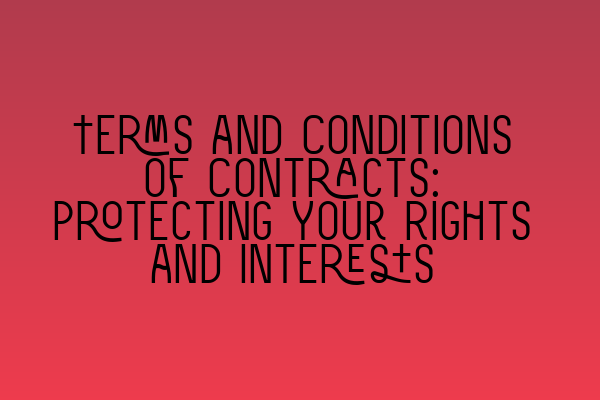Terms and Conditions of Contracts: Protecting Your Rights and Interests
In the world of business and commerce, contracts play a crucial role in establishing clear agreements between parties involved. Whether you are a business owner, freelancer, or simply someone entering into a transaction, understanding the terms and conditions of contracts is essential to protect your rights and interests. In this blog post, we will explore the importance of terms and conditions in contracts and highlight key elements you should consider. If you’re preparing for the SQE exam, check out our SQE 1 Practice Exam Questions and SQE 1 Practice Mocks FLK1 FLK2 to enhance your knowledge.
1. Defining the Terms
A well-drafted contract should clearly define the terms and conditions that govern the agreement. This includes outlining the rights, obligations, and responsibilities of each party involved. By clearly stating these terms, you can minimize misunderstandings, potential disputes, and legal complications.
Additionally, it is important to be specific and precise when defining the terms of a contract. Vague or ambiguous language can lead to interpretation issues and increase the risk of disputes. Ensure that all parties involved have a clear understanding of the meaning and intent behind each term.
2. Protections for Intellectual Property
Intellectual property (IP) is often a valuable asset in business transactions. Whether it’s trademarks, copyrights, patents, or trade secrets, it is crucial to address the ownership and rights to intellectual property in your contracts. By including provisions that protect your IP, you can prevent unauthorized use or infringement by others.
Consider consulting an IP lawyer to assess the best ways to safeguard your intellectual property in contracts. They can provide advice on registering your IP and ensuring it is adequately protected.
3. Limitation of Liability
Contracts should include provisions that limit liability for both parties involved. Limitation of liability clauses define the extent to which each party can be held responsible for any damages or losses arising from the agreement. By setting reasonable limits, you can protect yourself from unlimited liability and potential financial risks.
It is important to note that limitation of liability clauses must be reasonable and not overly restrictive, as they may be subject to scrutiny and may not be enforceable in court if found to be unfair or unreasonable. Seeking legal advice when drafting such clauses is recommended.
4. Dispute Resolution Mechanisms
Contracts should also address the process of resolving disputes that may arise during the course of the agreement. Including provisions for dispute resolution mechanisms, such as mediation or arbitration, can help parties avoid lengthy and costly litigation processes.
When drafting these provisions, consider the nature of the agreement, the complexity of the issues that may arise, and the most efficient and cost-effective methods of resolving disputes. Consult a contract law expert to guide you in selecting the appropriate dispute resolution mechanism for your specific situation.
Looking for more guidance on contract law? Check out our SQE 2 Preparation Courses and SQE 1 Preparation Courses to further enhance your understanding and knowledge.
5. Termination and Breach
Contracts should clearly outline the conditions and consequences of termination and breach. These provisions define the circumstances under which the contract can be terminated and the remedies available in case of a breach. By explicitly stating the consequences, parties can handle disputes more efficiently and ensure compliance with the agreement.
When drafting termination and breach clauses, it is essential to consider relevant laws and regulations governing such matters. Seek legal advice to ensure that these provisions align with applicable laws and regulations.
Conclusion
Understanding the terms and conditions of contracts is vital to protect your rights and interests in any transaction or agreement. By clearly defining the terms, protecting intellectual property, limiting liability, implementing dispute resolution mechanisms, and addressing termination and breach, you can minimize risks and potential disputes. If you’re preparing for the SQE exam, visit our website to stay updated on the SRA SQE Exam Dates and enhance your legal knowledge with our preparation materials.
Remember, working with a solicitor experienced in contract law can provide valuable guidance and ensure that your contracts adequately protect your rights and interests.
If you found this blog post insightful, make sure to share it with others who may benefit from the information.
